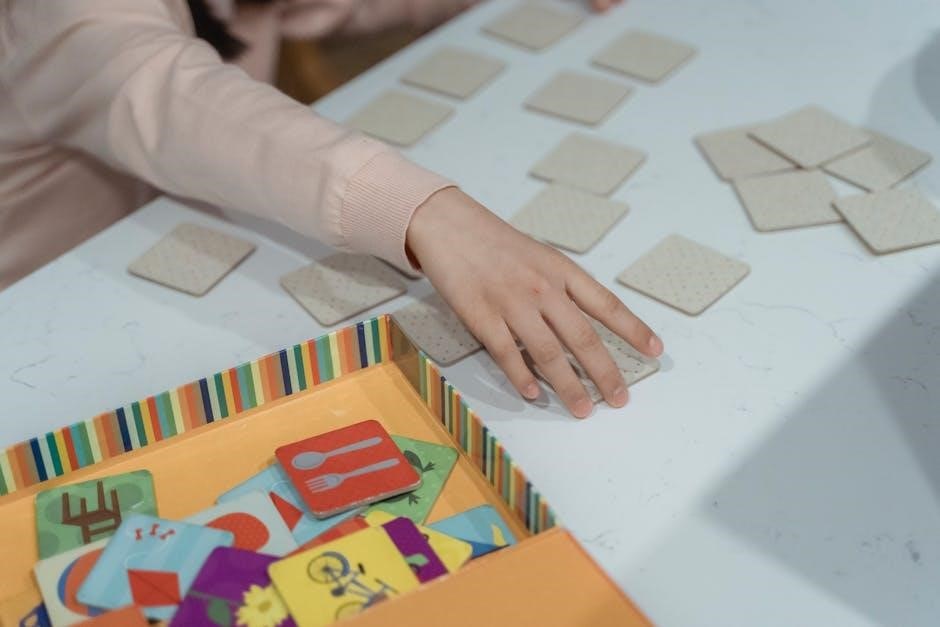Improving memory is a common goal for many, and brain exercises offer a effective way to achieve this. By engaging in activities like puzzles, learning new skills, or practicing Neurobic exercises, individuals can enhance their cognitive function and memory retention. Regular mental stimulation helps maintain brain health, especially as we age, making it easier to stay sharp and focused in daily life. Consistency is key to seeing lasting benefits.
What are Brain Exercises?
Brain exercises are activities designed to stimulate and enhance cognitive function, particularly memory, focus, and overall mental agility. These exercises can take many forms, from puzzles and logic games to learning new skills or engaging in creative hobbies. The primary goal of brain exercises is to challenge the brain, encouraging the growth of new neural connections and strengthening existing ones. This process, often referred to as neuroplasticity, helps the brain adapt and improve its functionality over time.
One of the most common types of brain exercises are memory-specific activities, such as memory games, mnemonics, and techniques like the “memory palace” or “peg list” systems. These methods help individuals organize and retain information more effectively. Other exercises might involve problem-solving, such as crosswords, Sudoku, or card games, which require critical thinking and strategic planning. Additionally, activities like learning a new language, playing a musical instrument, or practicing mindfulness can also serve as powerful brain exercises.
Brain exercises are not limited to traditional mental tasks. Physical activities, such as dancing or yoga, can also improve cognitive function by promoting blood flow to the brain and enhancing overall health. Neurobic exercises, which engage the five senses in novel ways, are another form of brain exercise. These activities encourage the brain to form new associations between different types of information, further strengthening cognitive abilities.

Importance of Memory Improvement
Improving memory is essential for enhancing overall cognitive function and quality of life. Memory serves as the foundation for learning, problem-solving, and decision-making, making it a critical component of daily functioning. Strong memory skills enable individuals to absorb and retain new information, perform tasks more efficiently, and maintain social connections by recalling important details about others. Over time, memory improvement can lead to greater confidence and independence, as individuals rely less on external aids like notes or reminders.

Additionally, memory improvement plays a significant role in maintaining mental health and well-being. Studies suggest that cognitive stimulation through memory exercises can reduce the risk of age-related cognitive decline and conditions such as dementia. By engaging in regular brain exercises, individuals can build cognitive reserve, which helps the brain compensate for age-related changes and maintain optimal function. This proactive approach to brain health is particularly beneficial for older adults but is valuable for people of all ages.
Enhancing memory also fosters personal growth and creativity. When individuals can recall information more effectively, they are better equipped to explore new hobbies, master skills, and pursue creative interests. Improved memory further enhances academic and professional performance, as it allows for better organization, time management, and goal achievement. In essence, memory improvement is a powerful tool for unlocking one’s full potential and living a fulfilling life.

Neurobic Exercises
Neurobic exercises are innovative brain exercises that engage the five senses, utilizing novel combinations of sensory experiences to enhance cognitive function. They encourage the brain to form new associations between different types of information. By stimulating the senses in unique ways, Neurobic exercises promote mental agility and adaptability. They are particularly effective for improving memory, focus, and overall brain health, making them a valuable addition to any cognitive training routine.
Understanding Neurobic Exercises
Neurobic exercises are a unique form of brain training that focuses on engaging the senses in novel ways to stimulate cognitive function. Unlike traditional brain exercises, which often rely on logic puzzles or memory drills, Neurobic exercises emphasize the use of sensory experiences to create new neural connections. By incorporating sight, sound, touch, taste, and smell into mental activities, these exercises enhance the brain’s ability to process and retain information.
These exercises work by challenging the brain to form associations between different types of information. For example, pairing a visual image with a specific scent or sound can strengthen memory recall. Neurobic exercises are designed to be simple yet effective, often involving everyday activities that are performed in unconventional ways. This approach helps keep the brain active and adaptable, promoting long-term cognitive health.
One of the key principles of Neurobic exercises is the idea of “novelty.” By breaking routines and engaging in unfamiliar mental tasks, individuals can stimulate areas of the brain that might otherwise remain inactive. This not only improves memory retention but also enhances problem-solving skills and creativity. Neurobic exercises are particularly beneficial for individuals looking to maintain or improve cognitive function as they age.

Research supports the effectiveness of Neurobic exercises in enhancing memory and overall brain health. Studies have shown that activities that engage multiple senses can lead to stronger neural pathways, making it easier to learn and remember new information. Additionally, Neurobic exercises are accessible to everyone, as they can be incorporated into daily life without requiring specialized tools or equipment.
Benefits of Neurobic Exercises
Neurobic exercises offer a wide range of benefits that can significantly enhance cognitive function and overall brain health. By engaging the senses in novel ways, these exercises strengthen neural connections, leading to improved memory retention, enhanced problem-solving skills, and better focus. One of the most notable advantages is the ability to slow down cognitive decline, making them particularly beneficial for older adults seeking to maintain mental sharpness.
These exercises also promote creativity and mental agility by encouraging the brain to think outside routine patterns. For instance, activities that involve multisensory experiences, such as linking smells to memories or using tactile sensations to aid recall, can create stronger, more vivid mental associations. This not only improves memory but also enhances the brain’s adaptability, allowing individuals to approach challenges with greater ease and innovation.

Another significant benefit of Neurobic exercises is their ability to reduce stress and improve mood. By engaging in mentally stimulating yet enjoyable activities, individuals can experience a sense of accomplishment and relaxation. This mental clarity can translate into better decision-making and a more positive outlook on life. Additionally, Neurobic exercises are accessible to everyone, requiring no special equipment or prior knowledge, making them an ideal choice for people of all ages and backgrounds.
Overall, Neurobic exercises are a powerful tool for improving memory, enhancing cognitive function, and promoting long-term brain health. Their unique approach to mental stimulation makes them an essential addition to any routine aimed at maintaining or improving mental agility and well-being.
Effective Brain Exercises

Engaging in effective brain exercises is a proven way to enhance memory, improve cognitive function, and maintain mental sharpness. These exercises are designed to challenge the brain in various ways, promoting neural plasticity and strengthening memory pathways. One of the most popular and effective exercises is solving puzzles, such as crosswords, Sudoku, or logic grids. These activities stimulate the brain’s problem-solving abilities and improve working memory.
Learning a new skill, such as playing a musical instrument, dancing, or learning a foreign language, is another powerful way to enhance brain function. These activities create new neural connections and strengthen existing ones, leading to better memory retention and cognitive agility. Additionally, activities that involve multisensory experiences, such as cooking or gardening, can also be beneficial, as they engage multiple brain regions simultaneously.

Physical exercise, particularly aerobic activities like walking or swimming, has been shown to improve memory and overall brain health. Exercise increases blood flow to the brain, boosting cognitive function and promoting the growth of new neurons. Even simple activities like meditation or deep breathing can enhance focus and reduce stress, indirectly benefiting memory.

Another effective strategy is to engage in mentally stimulating social activities, such as playing card games or participating in group discussions. These interactions challenge the brain in different ways and provide opportunities for learning and adaptation. Finally, incorporating memory-specific exercises, such as mnemonic techniques or memory palaces, can help improve recall and retention of information.
By incorporating these exercises into daily life, individuals can take proactive steps to enhance their memory and maintain cognitive health. Consistency is key, as regular mental and physical stimulation is essential for long-term brain benefits.

Leave a Reply
You must be logged in to post a comment.